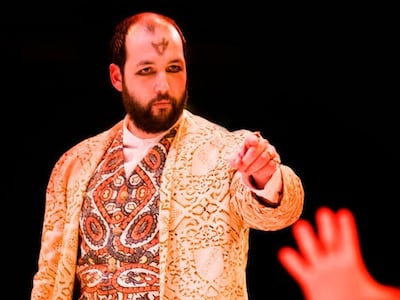Youssef Kerkour has recently finished filming Ridley Scott’s biopic ‘Napoleon’ with Joaquin Phoenix, Vanessa Kirby and French-Algerian actor Tahar Rahim, and has just been named the lead in ITVX’s unromantic-romance ‘Significant Other’ alongside Katherine Parkinson. As shooting is due to begin, we revisit our interview in which he explains that the acting end goal was always to have the luxury of choice about the parts he plays. This article was originally published on July 22, 2021.
For an actor who has taken direction from Ridley Scott, received a Bafta nomination and just been cast in the forthcoming film adaptation of one of the most-read books of all time, Youssef Kerkour has a surprisingly dim view of himself.
“I’m a real loser,” Kerkour tells The National.
The self-assessment, though, is more a reflection of the British-Moroccan’s dedication to his craft than a dismissal of his long list of accomplishments on stage and screen.
“I just have a singularity of focus, especially when I’m away filming,” Kerkour, 43, says. “I do the same thing: I go on set to do my job and I go back to the hotel, I have a shower, I order my dinner, I read my lines, I eat my dinner, I do my prayers, I look at my lines again … I live spartan.”
Even when not working, the star of the Channel 4 comedy series Home loves nothing more than, well, the comforts of hearth and home, preferring to sit in front of the TV with a cup of tea with his wife and two-year-old daughter. Work, sofa, rinse and repeat, Kerkour says.
Regular bouts of idleness are, he explains, the secret to his staying power on set. “I can work harder, longer and faster than most people because I haven’t expended any energy anywhere else. It’s all reserved for work."

Kerkour’s predilection for the theatrical was evident from an early age. He was born to a Moroccan father, a professor of mathematics, and an English mother, a school teacher, in Rabat. His parents met in France in the 1960s, married and moved to the capital of Morocco on the shores of the Bouregreg River and the Atlantic Ocean, where they still live.
As a child, he loved to sing and dance, “tapping around, messing about”, being Fred Astaire one minute and then doing everything backwards as Ginger Rogers the next.
He recalls his first trip to the cinema as clear as day. His father took him and his brother, Brahim, to see Enter the Dragon, the movie that became the most successful of all time in the martial arts genre.
“We were way too young but he took us there and Bruce Lee just became this thing,” Kerkour says. “I very much remember – and I wish this for other young people – the idea of holding up an actor as a sort of idol that you want to be like, who represents all the things you want to be.
“I believe in that very much. You know, the big poster in the bedroom, where you just look at them every night.”
In his early teens, the American school where Kerkour was a pupil arranged a trip to Stratford-upon-Avon, the birthplace and home town of Shakespeare.
While retelling the powerful moment that he watched as the character of Henry V swung on a chain across the stage with pyrotechnics going off and smoke billowing, Kerkour can't help but recite “once more unto the breach, dear friends, once more”.
Many years later, he read the reviews of that season at the Royal Shakespeare Theatre. “They got absolutely destroyed,” he says. “But for me, it made me want to be an actor.”
The souvenir posters for the performances of Henry V and Measure for Measure still hang on the wall of Kerkour’s childhood room in Morocco, on which he has crossed name after name off the cast list when, in a kind of kismet circularity, he has performed with those very same actors.
Back then, though, he was developing a mental block about his professional calling, the result of the deep concerns of his “extremely sensible” parents, especially his father.
“He wanted me to get a proper job and was worried all the time about how I was going to eat,” Kerkour says. “My mother worried as well, but she secretly loved the way I used to sing when I was a kid. She said I was going to be an opera singer one day. I know it was half wishful, half joke.”
It would be decades before he discovered his parents’ own creative gifts. Not only was his mother a talented singer but Kerkour walked into a room one day to find watercolours all over the place that she had been idly painting, “and it was the most amazing artwork I’ve ever seen".

Kerkour’s father, as it turns out, did theatre when he was younger, learnt French by reading cinema magazines cover to cover and was a film buff “who knew everything about every actor”.
“So what I’m trying to say is that my brother is a composer and musician. My parents are highly artistic and artistic-minded … I think that’s where I get it from.”
Mindful of his risk-averse parents, the young Kerkour went to Bard College in upstate New York to study psychology but spent so much time taking dance and acting classes that an indulgent professor wrote “M” for “missing” instead of failing him at the end of the first year.
“I need to tell you, as a psychiatrist, I think you’re an actor,” the academic advised his errant student. "You need to just commit to it.”
His acting stint in the US, however, was cut short by the 9/11 attacks. A government protocol in national emergencies meant that he could not obtain the necessary visa to stay, so he ended up in England.
Not knowing anyone in the industry, with few screen credits to his name, he decided he had to start again, building from the ground up at drama school.

Kerkour went "all in", undertaking two years at the prestigious London Academy of Music and Dramatic Art and setting a record of sorts during five years with the Royal Shakespeare Company by performing three plays a season and memorising around 15 parts a year.
The renowned theatre group that had so beguiled him as a school boy was, he says, his “biggest education”.
He would go on to build a strong standing in the industry, recognised many times over with such achievements as a Bafta Breakthrough award in 2020 and his role in the soon-to-be-released House of Gucci alongside Al Pacino and Salma Hayek.
During his two decades in London, Kerkour says he has become a “cosmopolitan with a capital C”. He has a deep affection for the city, and can often be found living up to his reputation as a "notorious coffee drinker" in the cafes of Soho.
“It’s got everything you need, all different walks of life,” he says. “I love the different languages here and cultures, the people. It’s just wonderful.”
Perhaps it reminds him in some way of his time at the American School in Rabat, where he was surrounded by students from all over the world in an environment that encouraged critical and expansive thinking.
It was where he began to understand the positives of multiculturalism and immigration. “I’m a recipient of the benefits of it, being multilingual and the power that comes with that,” Kerkour, who speaks Arabic, English, French and Italian, says.
He believes in immigration “110 per cent”, he says, and disturbed by injustices and the harsh reality facing refugees, he is a staunch advocate for their rights. It burns him up, he concedes, when imagining the future.
“I think about what the world is going to look like in 20 years’ time and who my children will be forced to become as a result,” Kerkour says.
There’s some comfort drawn from the influence his profession can have. He has said in the past that he was positive he would never be cast as Sami Ibrahim, the Syrian refugee in Home who sneaks into the back of a car belonging to a middle-class family on their way home to England from France.
“If a guy like me can get hired to play a very sweet, cuddly Syrian refugee, then it means the industry is changing a little bit – but there is so much more to do.”

By “a guy like me”, he is referring to his 6 feet 5 inches, heavy-set frame and the fact that he has often played ruffians, terrorists or killers.
Kerkour has adopted a stoic approach to the typecasting over the years, the lack of representation and diversity and the sweeping generalisations that have so often been painted on the Arab world by the West.
“If you’re being typecast, it means you’re working,” he says firmly. “If you’re working, you’re actually in the conversation. You’re not a follower. You’re a leader, you’re a doer and you get to actually decide things later on.
“My whole thesis on how to survive as an actor is to reach a position where you can say 'no'. I need to have money and therefore I have to take every job that comes my way. But not all of them make me happy.
“It's just about divorcing emotions from things and understanding that to achieve a goal, you might have to feel like you're losing all the way until you achieve it.”
In his darkest moments, Kerkour has relied on his faith, saying that he prays that something happens to change things for the better as well as for his own sanity.
Conjuring up memories of the Mena region also helps. He talks about being a proud Arab out on the streets of Morocco, hanging out with friends at the beach, going bowling or the time that he, along with most other inhabitants of Rabat, drove more than 80 kilometres to Casablanca to queue for hours at the newly opened McDonald’s outlet.
Kerkour evokes the immediate familiarity with which his countrymen greet each other, the way that “everyone treats you like a neighbour or old friend”, and the natural adaptability that allows them to fix any problem or get by no matter the situation.
He is, he says, passionately Moroccan, adding with a laugh, “as everyone in England will tell you”.
His recollections go beyond the social and practical to the spiritual as he describes the unexplained feeling that occasionally washed over him – “it’s the land, it’s the territory just breathing” as he puts it – when time would slow down, the light went a certain way and all sound receded.
“My life in Morocco was glorious … the colours and the way the wind moves, it’s magic. It’s magical.”
All that, Kerkour says, he carries with him wherever he goes and he is convinced that it is partly what secured him his forthcoming role in The Alchemist.
Co-produced by Will Smith and starring Sebastian de Souza and Tom Hollander, it is an adaptation of the best-selling novel by Paulo Coelho, which aptly enough is a blend of spirituality, magic realism and folklore, being shot in Morocco from September.
Kerkour says the mystical fable is a beautiful book about the real world, "about life".
The story of a young man who believes in the magical, sets off to distant lands, risking everything and overcoming all obstacles to realise his dream. The parallels with his own journey can't help but make Kerkour, like Coelho's shepherd, an inspiration.


